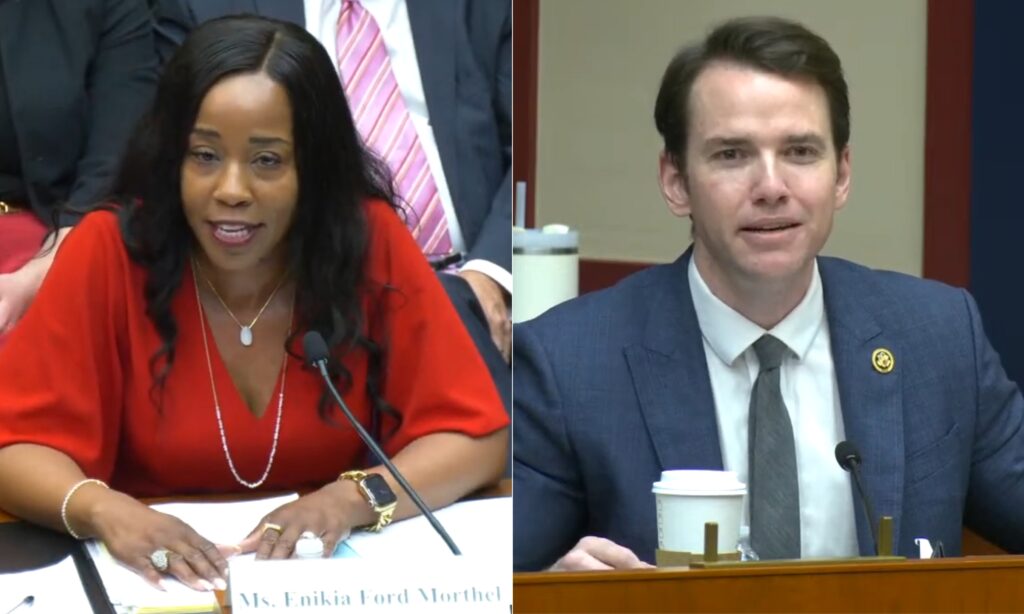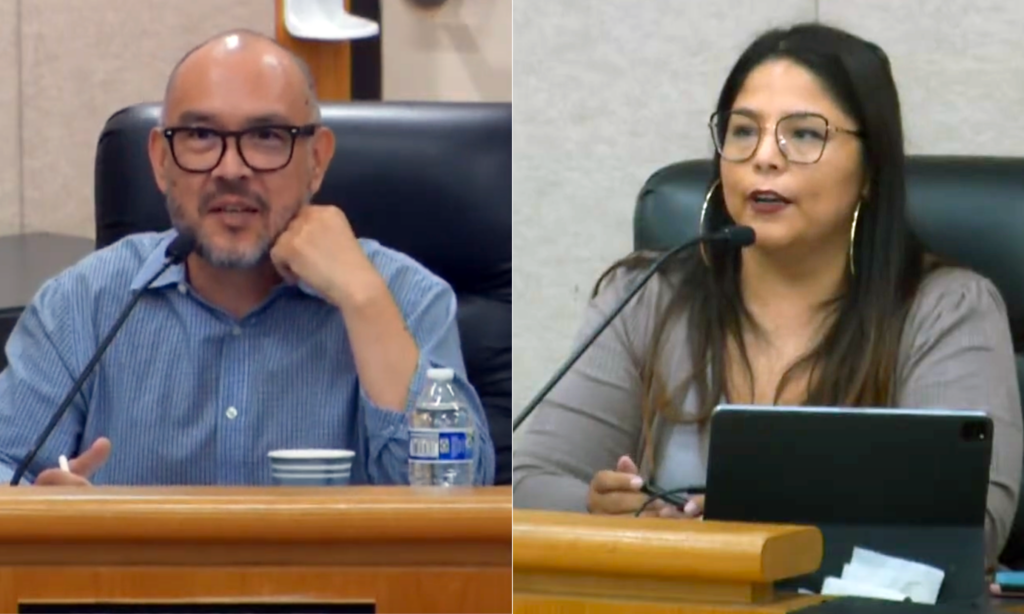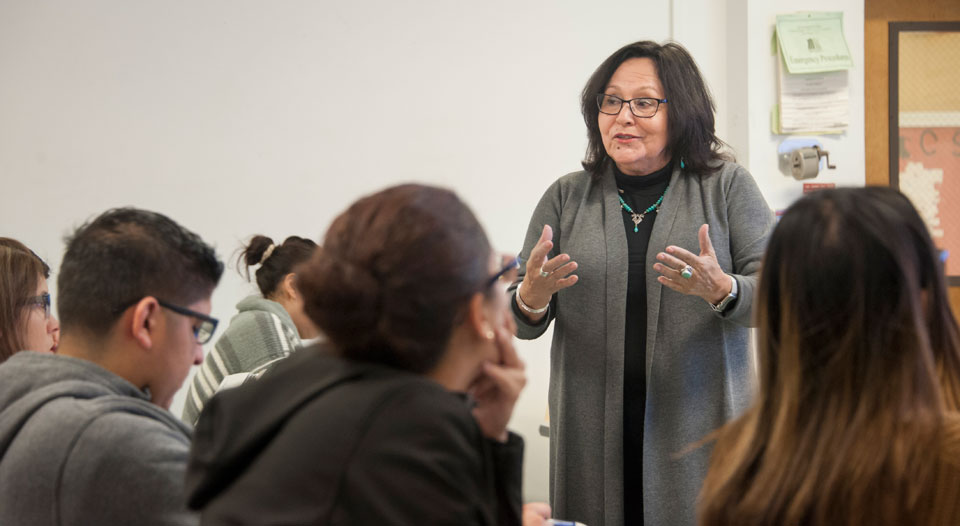
Berkeley Unified School District Superintendent Enikia Ford Morthel and Republican Rep. Kevin Kiley at the House Education and Workforce Committee hearing on May 8, 2024.
Credit: YouTube
A first-term California congressman sparred with the superintendent of Berkeley Unified and denounced the district’s choice of a consultant to create an ethnic studies curriculum during a House subcommittee hearing on antisemitism in K-12 schools Wednesday at the Capitol.
During his five minutes allowed for questioning, U.S. Rep. Kevin Kiley, a Republican representing a huge expanse of eastern California, pressed Superintendent Enikia Ford Morthel about the Liberated Ethnic Studies Model Curriculum Consortium.
The group pitches to school districts in California an alternative to the state’s ethnic studies model curriculum framework with a focus on dismantling capitalism, systems of racism, and Zionism, which it equates to colonialism. The group’s leaders include ethnic studies professors from California State University and the University of California.
https://www.youtube.com/watch?v=X-tcSzYrQr8
The district hired the group on a one-year contract in June 2023 for $111,120 to serve as what Ford Morthel called “a thought partner.” Berkeley’s memorandum of understanding said that the district’s Ethnic Studies Advisory Committee recommended the group as a “content expert group” that would “provide instructional materials, teacher training, and consultation for implementing ethnic studies.”
The consortium’s contract is up for renewal next month. Jewish parents in Berkeley have written the school board opposing continuing it. In their letter, the parents criticized the consortium as pushing “a non-inclusive, biased, divisive, and one-sided ideological world view.”
Ford Morthel testified Wednesday that the district has not purchased a Liberated Ethnic Studies curriculum. Rather, she said, the district takes pride that teachers and community partners have written the curriculum. Teachers created lessons on Israel and Palestine because of “a lot of curiosity, a lot of questions, and quite frankly, a lot of confusion from many of our students wanting to know what was going on.”
The district did not respond Thursday to EdSource’s question on what the consortium is providing the district.
The district has not released the lesson plans, and a parent, Yossi Fendel, has sued the district for them. Fendel said that what he had been allowed to view of the ninth-grade lessons was biased against Israel and violated the district’s policy on teaching controversial issues, the publication Berkleyside reported.
The Liberated consortium is one of several consulting groups whose curriculum proposals have generated controversy in Sacramento and Berkeley.
The 16 members of the leadership team are listed on the Liberated Ethnic Studies Model Curriculum Consortium’s website and include leaders from across the state in ethnic studies.
In 2019, state officials sharply criticized the first draft of the ethnic studies curriculum and ordered major revisions by writers from the state Department of Education. The authors disavowed the state’s model version of the curriculum and broke off to create the Liberated Ethnic Studies Model Curriculum.
Critics included State Board of Education President Linda Darling-Hammond and State Superintendent of Public Instruction Tony Thurmond. The Jewish Legislative Caucus cited the curriculum’s one-sided view of the Israel-Palestine conflict and a favorable definition of the “boycott, divestment, sanctions movement,” which calls for sanctions and boycotts of Israel. Gov. Gavin Newsom called the document “insufficiently balanced and inclusive.”
Please answer yes or no
Early in the two-hour hearing, the chair of the subcommittee, Rep. Aaron Bean, R-Fla., forced Ford Morthel and the other two superintendents on the panel, New York City schools Chancellor David Banks and Montgomery County school board President Karla Silvestre, to give one-word answers to a series of complicated questions. One was whether the phrase “From the river to the sea Palestine will be free” is antisemitic.
Yes or no, Bean asked?
“If it is calling for the elimination of the Jewish people in Israel,” Ford Morthel responded. “And I will also say that I recognize that it does have different meanings to different members of our community.”
“I’m going to go ‘yes.’ I’ll put you down, yes,” Bean said.
Kiley used that answer against her during his questioning. He referred to a slide in the teacher-prepared curriculum that cited the “From the river to the sea” phrase as a call for freedom and peace and paired it with a “supportive quote” by Rep. Rashida Tlaib, D-Michigan, soon after the Oct. 7 attack by Hamas in Israel. Congress censured Tlaib on a 224-188 Republican-led vote, with members claiming it implied support for armed resistance to abolish the state of Israel.
Many people, including most Jews, also view it that way. Others, Tlaib included, say it evokes future coexistence where everyone can live in freedom in Palestine.
“Do you think that’s an appropriate thing to have on a slide for students?” Kiley asked Ford Morthel.
“So,” she replied, “we definitely believe that it’s important to expose our students to a diversity of ideas and perspectives. And if it was presented as a perspective, I do think it’s appropriate.”
“You said earlier you thought this was antisemitic, and you put this on a slide in the classroom, and then students go around the hall saying it. I don’t think there’s anything surprising about that,” Kiley said.
Noting that the district passed a policy against hate speech last year, Ford Morthel said, “Public schools reflect the values and aspirations of their local communities. Berkeley is no different.
“Our history of activism, social justice, diversity, and inclusion is alive and well today. And we recognize the need to teach students to express themselves with respect and compassion.”




